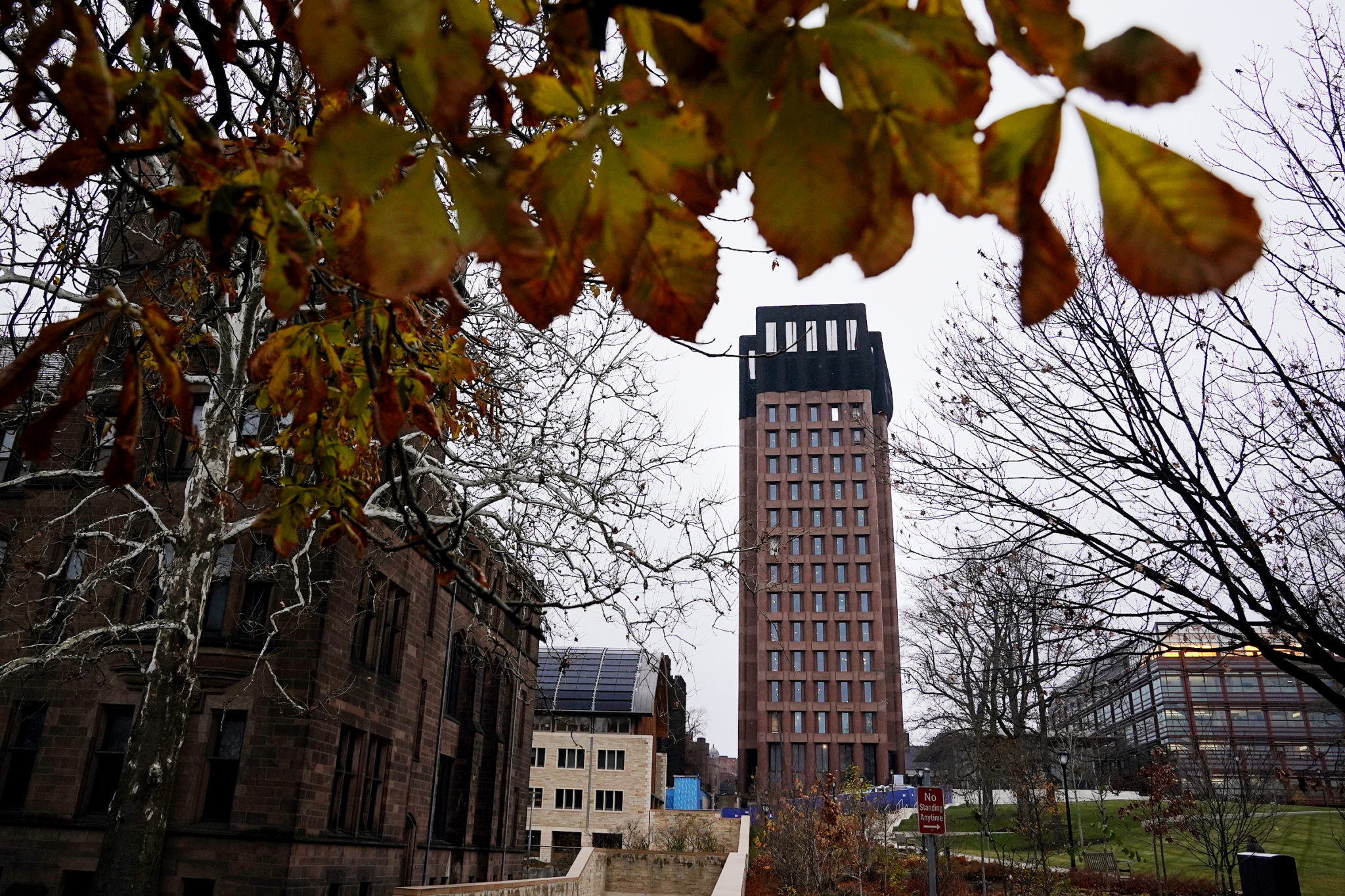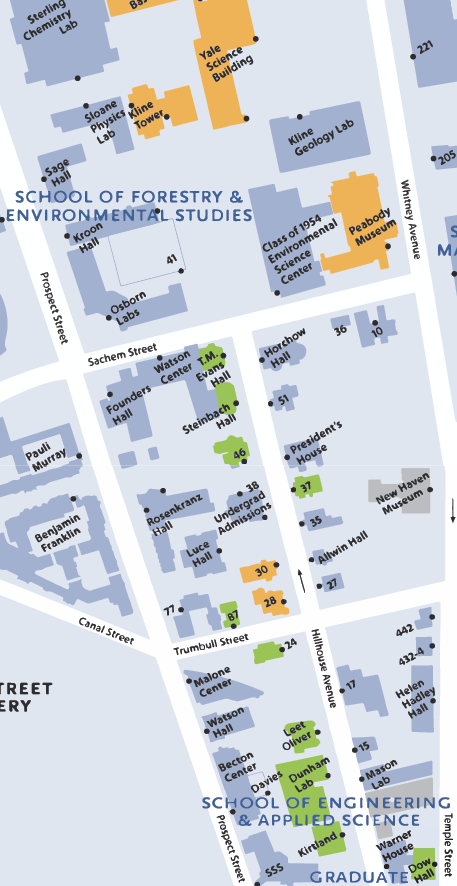Departments play “musical chairs” across campus spaces
Over half of the departments in the Faculty of Arts and Sciences have recently relocated, moved into renovated space or have plans to do so next year. The shuffling comes from a wave of large construction project completions around campus.

Claire Lee, Contributing Photographer
Professors are being shuffled across campus as the University continues to carry out a series of renovations and construction projects.
More than half of the 45 departments in the Faculty of Arts and Sciences have moved into new or newly-renovated spaces in the last two years, or have imminent plans to do so in the next two years. A group of 16 departments largely in the Humanities and the Biological Sciences have already completed their moves, and an additional seven have relocations coming in the near future.
Though University construction projects and department Swift Moves are perpetual occurrences on campus, this is perhaps the greatest number of moves the University has ever seen in such a timeframe, according to Tamar Gendler, Dean of the Faculty of Arts and Sciences.
“This is a very exciting time,” said Pericles Lewis, Vice Provost for Academic Initiatives. “Of course, it involves a bit of moving people’s offices and playing a little bit of musical chairs, but overall, we’ve got a lot of improved space on campus, and that’s going to be a big positive for recruiting additional excellent faculty.”
A number of construction projects that have been finalized or will soon wrap up are concentrated around Central Campus and Science Hill. The recent series of office moves was kicked off by the October 2019 opening of the Yale Science Building, which houses the departments of Molecular, Cellular, and Developmental Biology as well as Molecular Biophysics and Biochemistry. The Humanities Quadrangle — formerly known as the Hall of Graduate Studies — opened in May 2020 and now houses 14 humanities departments as well as the cross-disciplinary Department of American Studies.
Upon completion of the new Tobin Center for Economic Policy next year, Economics faculty will join the whirlwind of moves as they are centralized from various buildings on Hillhouse Avenue. To make room for the center, the house at 87 Trumbull Street was lifted from its foundation and moved 600 feet down the street in late August. The Psychology department, with its main offices in Kirtland Hall, is also preparing for new space in the building at 100 College Street.

Meanwhile, a new “neighborhood” consisting of the Department of African American Studies, the Program of Ethnicity, Race and Migration and the Program of Women’s, Gender and Sexuality Studies will emerge along Wall Street once the Ethnicity, Race and Migration Program moves from the western side of campus into space in the building at 82-90 Wall St.
“The main perk of this move, as we see it, is the fact that all faculty members will be in the same building,” wrote Ana Ramos-Zayas, the Ethnicity, Race and Migration Program chair. “Right now, that’s not the case. Also, as emotionally meaningful as 35 Broadway may be, the reality is that the building feels very “institutional,” with few windows and not the greatest layout. We are looking forward to an open house of sorts once we’ve moved.”
Kline Tower, formerly known as Kline Biology Tower, will see its renovations finalized in summer 2023 after being closed in 2019, Dean of Sciences and Engineering Jeff Brock said. Space was freed up in the tower by departments moving into the Yale Science Building, and now the departments of Mathematics, Astronomy and Statistics and Data Science will each occupy three floors of the tower, a move representing around 70 total faculty, according to Brock. Kline Tower will also have additional floors devoted to graduate students and administrative functions.

Those three moves will relieve pressure on the upper portion of Hillhouse Avenue, where classroom and office space has become limited. The Mathematics Department is currently in Leet Oliver Memorial Hall, the Astronomy Department in the mansions along Hillhouse Avenue and Statistics and Data Science Department in the Dana House at 24 Hillhouse Ave. The Jackson Institute for Global Affairs will eventually occupy several of those buildings.
Among the few humanities departments that have not been relocated to the Humanities Quadrangle are the three housed in Old Campus halls: English in Linsly-Chittenden Hall, philosophy in Connecticut Hall and classics in Phelps Hall.
“The department is very attached to Connecticut Hall, but we are outgrowing the building, and our graduate students in particular aren’t very well-served by it,” Philosophy Department chair Kenneth Winkler wrote to the News. “A move is something we may be considering in the coming years, if the opportunity arises.”
At least two departments, both in the lower portion of Hillhouse Avenue, have been promised new spaces that have not yet been determined. The Linguistics Department, which is currently housed in Dow Hall, will move to the building at 82-90 Wall St. next year for a two-year stay before being assigned a new permanent home. The burgeoning faculty of computer science, meanwhile, will remain in Arthur K. Watson Hall until new space can be found, according to Gendler.
“I hope that our new permanent home will give us the kind of space that allows us to continue to be a community where students, post-docs and faculty can work collaboratively, and that it will be located in an area that will foster interaction with our intellectual partners,” Linguistics Department chair Raffaella Zanuttini wrote to the News.
“AKW is one of the most gloomy buildings you could ever find on campus,” computer science professor Lin Zhong said. “We need more people to teach, but right now we’re running out of space.”
Along with the departments moving in the near future, some engineering departments as well as physics are looking forward to the construction of the Physical Sciences and Engineering Building, or PSEB. The project, whose second phase committee was announced last week, will require the destruction of several buildings on Science Hill and is currently slated to open in 2027.
The Department of Ecology and Evolutionary Biology will see renovations to its spaces on Science Hill at some point in the future, Gendler added.
Decisions regarding which departments are moving, and where, are made by a range of administrative officials, Lewis told the News. University Provost Scott Strobel, who oversees the University’s operations and financial affairs, works on building construction logistics with several committees within his office, as well as the Vice President for Facilities and Campus Development John Bollier, who is set to retire in January.
Gendler added that one or two professors, usually divisional deans or long-serving faculties, typically coordinate faculty-related issues with each large construction project. Professor of molecular, cellular and developmental biology Anna Marie Pyle steered planning for the Yale Science Building, for example, while Kathryn Lofton and Jeff Brock, deans of humanities and the sciences and engineering, oversaw the opening of Humanities Quadrangle and Kline Tower, respectively.
Faculty are factored into decision making, Lewis said, pointing out that the new PSEB committee is largely composed of professors. Projects must also be approved by the Buildings and Grounds Committee of the Board of Trustees.
“It’s absolutely thrilling to be stewarding the Faculty of Arts and Sciences at this transformative moment in its history,” Gendler said.








